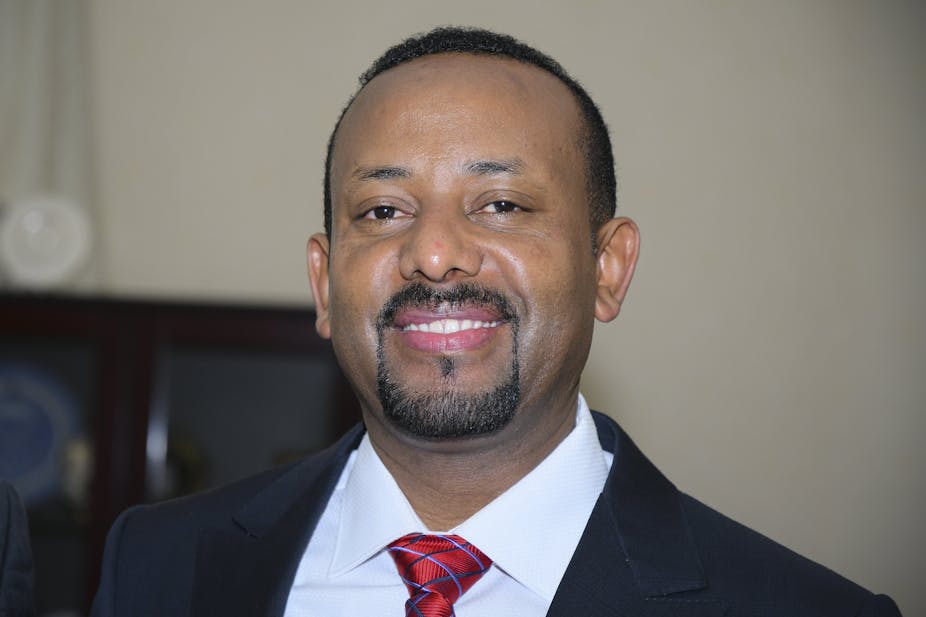Dr Abiy Ahmed has been chosen as a consensus replacement for outgoing premier Hailemariam Desalegn. Ahmed was sworn in by the Ethiopian Parliament on Easter Monday.
Ahmed chairs the Oromo People’s Democratic Organisation. Nevertheless, he is known for being in favour of Ethiopian unity and used his inaugural address to advocate for two ideals that bind Ethiopians – shared sacrifice and common destiny.
Most Ethiopians believe the incoming premier will pursue political reforms. And given his leadership role in the Oromo People’s Democratic Organisation, his ascension to the top political post in the country could be a game changer. This stems from the fact that Oromia, the party’s stronghold, has been the epicenter of anti-regime protests. His election means that the ruling coalition has a good shot at calming the Oromo protests, while strategically earning the legitimacy it craves.
On top of this, Ahmed’s election has given the Ethiopian People’s Revolutionary Democratic Front (EPRDF) the stability the ruling coalition has long been seeking in a country ravaged by unprecedented levels of ethnic tension.
A divided country
Political commentators agree that prior to Ahmed’s election the Oromos, one of Ethiopia’s largest ethnic groups, were poised to exert more influence than ever before. The same has been said of the Amharas, who expressed their solidarity with the Oromos during Ethiopia’s recent political protests.
The Oromo protests were against political repression under successive regimes, and a reaction to the country’s politics that succeeded in creating divisions along ethnic lines.
While Ahmed’s leadership will help quell Oromo and Amhara disquiet, he faces a hard road on other fronts. One difficult task he faces is creating consensus between ethnic Amharas in the volatile northern region, and their Tigray hosts.
There is also another point of contention when it comes to the most powerful party within the ruling coalition. For the past 27 years, the Tigrayan People’s Liberation Front, which is part of the EPRDF coalition, has been in control of state institutions such as the army and intelligence units.
The general belief is that the party has used these instruments of power to pit the Oromos against the Amharas. The resulting mistrust between the two groups has resulted in strained inter-ethnic relations.
Lately however, new leaders in the Oromo and Amhara camps have made strong attempts to forge a new partnership and the level of trust amongst them has increased. These efforts paved the way for Ahmed’s rise to power, as the Amharic candidate gave up his bid so that he could support the new prime minister.
Ahmed’s election means that for the first time in 27 years Ethiopian nationalism is gaining momentum. Ethiopia’s ethnic federal arrangement was designed to empower ethnic groups and devolve power to local administrations. However, this arrangement has suffered from severe challenges. Regional states have been co-opted by the federal government and ethnic tensions exacerbated. Forced evictions of natives from their ancestral lands are common. Therefor, Ahmed’s unifying inaugural speech has been viewed as a promise for a new day.
Ahmed’s position as premier will be strengthened by the emergence of the Amhara and Oromo partnership as a force against the dominance of the Tigrayan People’s Liberation Front within the ruling coalition. EPRDF must now ensure its survival by entrenching democratic procedures and nurturing inter-party relations.
Great expectations
When former premier Meles Zenawi died in 2012, Ethiopia’s ruling coalition focused on implementing the “Zenawi vision” which was more about economic development than political consensus.
For those who want to see the regime move away from the Zenawi ethos and rhetoric the new prime minister’s call for a fresh approach to leadership already give provided some hope.
Ethiopians also expect Ahmed to end the state of emergency that was enforced after former Prime Minister Hailemariam Desalegn’s resignation. Under the state of emergency some prisoners who had recently been released have been rearrested.
If he doesn’t lift the state of emergency Ahmed will struggle to govern.
Renewed role in the Horn of Africa
The new leadership led by Ahmed must also figure out how to strengthen Ethiopia’s position in a volatile region, and how to nurture inter-state dialogue.
In his inaugural address Ahmed called for renewed relations with Eritrea which itself has signalled that there might be better relations between the two countries. Any developments on this front would significantly improve peace in the region.
Ahmed also said that his foreign policy would focus on mutual interests and mending strained ties with countries in the region and beyond. This is a good sign for increased regional cooperation.
Despite his good intentions, the jury is still out. Ethiopians must assess the new premier’s promises with cautious optimism even as they give him the benefit of the doubt.

